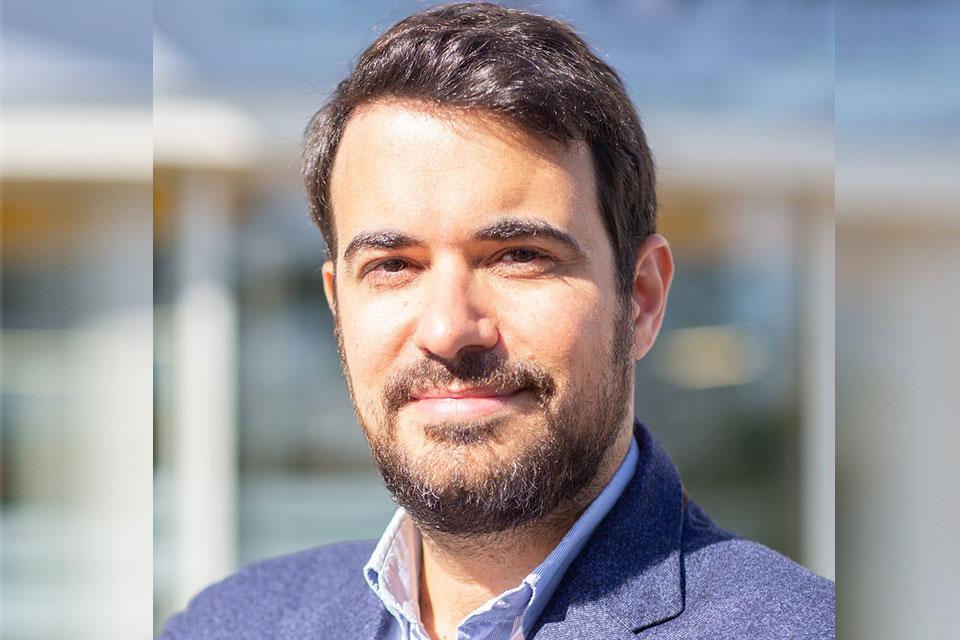We work among extraordinary people doing extraordinary things; get to know some of them by reading these quick-fire interviews.
Name: Karolos Potamianos
Job title: Ernest Rutherford Fellow
What are you currently working on?
My research focuses on unravelling the foundations of the Standard Model of particle physics: the mechanism of Electroweak Symmetry Breaking (EWSB), from which the Higgs boson, that gives massive particles their mass, arises.
Using the data collected by the ATLAS experiment at the Large Hadron Collider, I study a process called vector boson scattering (VBS), essentially using the LHC as a boson collider! I probe the scattering of two W bosons with the same electric charge. This process is so rare that it took LHC Run-2 to observe it in 2018.
VBS is an essential process to study because its production rate is directly affected by the Higgs boson (discovered in 2012), which is exchanged during the scattering process. As such, VBS is a probe into the nature of EWSB. Precision measurements will help us constrain physics models beyond the SM (BSM), in the quest for new physics.
My current focus is on finding new ways to measure the polarisation of the W bosons to measure the rate at which two longitudinally polarised W bosons (the longitudinal polarisation of the W boson arises directly from EWSB) scatter. This is even rarer and happens only in about 1 out of 15-20 same-charge WW scattering events. It is essential to measure that rate as precisely as possible.
To enable these precision measurements in the future, I work on developing novel silicon detectors for the upgrade of ATLAS and experiments at future colliders. My research is on ultra-fast detectors that measure very precisely (at the level of tens of microns and picoseconds) the position and time-of-arrival of particles produced during the collisions. This helps us get a greater understanding of what is going on and improve the precision of our measurements. This work requires a lot of novel R&D to overcome the many challenges.
Describe a typical day.
Most days include meeting collaborators (currently mostly remotely) and discussing physics ideas. Because my collaborators are in different time zones, these meetings tend to happen in the afternoon. Before that, I get to work on my research (this time is precious!) and catch up on my correspondence (there’s always something needing attention in a collaboration as large as ATLAS). After some personal time in the early evening for dinner and other activities, I like to get back to physics later in the evening, as I find that time of day stimulating and great to come up with new ideas for projects! All this is powered by tea, coffee, and delicious food.
These days, I go to CERN to work on the detectors, meet colleagues, and supervise the operations of the ATLAS detector. CERN is a great place to meet fellow physicists and learn about the latest updates and ideas. I hope we get back to in-person interactions soon!
If you had an entire day at your disposal, what would be your ideal way to spend it?
My ideal day would combine personal time to read (not only books on physics, but also on politics, economy, and novels in general), acquire new skills (in various areas, from technical skills such as new data analysis and machine learning techniques to project management or student supervision), and social activities! I also like to travel and explore new cultures and places.
Research would also be a part of my ideal day (the fun bits, of course)! I’m lucky that most of my job feels like a hobby one takes seriously. My Ernest Rutherford Fellowship greatly helps with that, enabling me to focus on my research, limiting other duties.
What is your favourite place in Oxford?
Currently based at CERN in Geneva, my experience of Oxford is unfortunately limited (though I very much look forward to changing that soon!), but I loved wandering through the corridors of the Ashmolean admiring its collections. I’ve done this each time I visited Oxford; I find it very stimulating, and it helps my thought process.
Plan B: what would you be if you weren’t doing the job you are currently doing?
I’m lucky enough to get to enjoy my plan B from time to time and use my skills and knowledge to make the world a better place. Since 2014, when I co-founded THE Port (https://theport.ch), I’ve been actively involved in organising yearly Humanitarian Hackathons, during which we use science and technology – and the great working environment at CERN – to provide tangible solutions to humanitarian challenges set out in collaboration with the UN and other NGOs.
More recently, I got to apply large-scale data analysis methods and techniques developed in high-energy physics towards real-world applications, such as airplane tracking using satellite data. In 2020, I co-founded gluoNNet (https://gluoNNet.com) for that purpose. Though I only can afford an advisory role because of my Fellowship, I get to be involved in exciting applications of learnings from doing fundamental science! I even got to work on quantum machine learning algorithms!
What discovery would you like to see in your lifetime?
I’ll pretend you’re a genie and I get three picks ;)
I would be happy to know what dark matter is made of, or what’s wrong with our theoretical models should there be no hints of it. I have hopes that our experiments will shed some light on this within my lifetime.
I hope that we discover new ways to accelerate particles on earth, both for medical therapy and for building powerful particle colliders to learn more about the fabric of our Universe. Plasma Wakefield Acceleration is a promising technique, but it still needs lots of R&D.
Another area that is in dire need of breakthroughs is nuclear fusion: discovering how to get replicate the activity at the centre of our sun would be a huge step towards the sustainability of our species on this planet.

